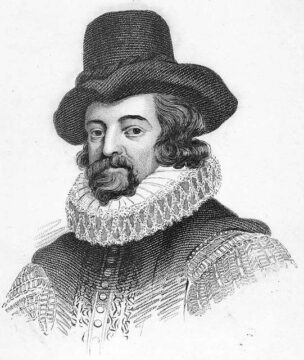Louise Liebeskind at The New Atlantis:
 In form, Francis Bacon’s New Atlantis is modeled loosely on Thomas More’s Utopia. A ship full of European sailors lands on a previously unknown island in the Americas where they find a civilized society in many ways superior to their own. The narrator describes the customs and institutions of this society, which in Bacon is called “Bensalem,” Hebrew for “son of peace.” Sometimes Bacon echoes, sometimes improves upon, More’s earlier work. But at the end of the story, Bacon turns to focus solely on the most original feature of the island, an institution called Solomon’s House, or the College of the Six Days Works.
In form, Francis Bacon’s New Atlantis is modeled loosely on Thomas More’s Utopia. A ship full of European sailors lands on a previously unknown island in the Americas where they find a civilized society in many ways superior to their own. The narrator describes the customs and institutions of this society, which in Bacon is called “Bensalem,” Hebrew for “son of peace.” Sometimes Bacon echoes, sometimes improves upon, More’s earlier work. But at the end of the story, Bacon turns to focus solely on the most original feature of the island, an institution called Solomon’s House, or the College of the Six Days Works.
This secretive society of natural philosophers seeks nothing less than “the effecting of all things possible,” as C. S. Lewis duly notes. Bacon devotes a quarter of the total text of New Atlantis to an unadorned account of the powers and insights the philosophers in Solomon’s House have. Then the work ends abruptly with no account of the sailors’ trip home or the results of their discovery. The story ends mid-paragraph, with a final line tacked on at the end: “The rest was not perfected.”
more here.
